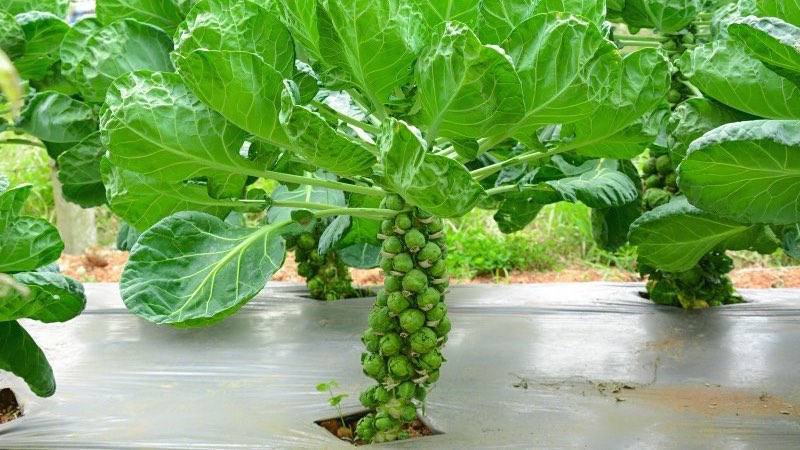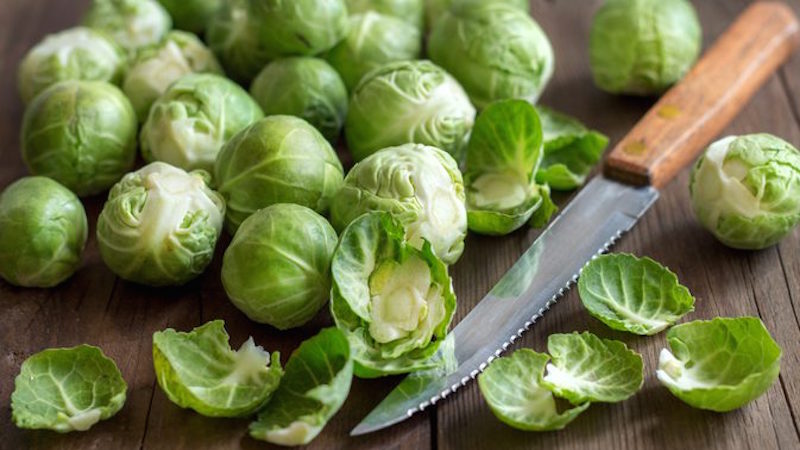Health Benefits of Brussels Sprouts
Last updated on
Brussels sprouts is a member of the Brassica family together with broccoli and cabbage. It is like a miniature cabbage head and can be found among the larger green leaves usually sprouting from a 3-foot main stem in bunches of about 20 to 40. As a member of the cabbage or Cole family, it has the same growing habits and needs as the cabbage.
Brussels sprouts is a perennial plant although you can get the best quality during the peak of their growing season from autumn towards the early part of spring.
Nutritional Benefits of Brussels Sprouts
Brussels sprouts is an excellent source of vitamin A, C, E and one of those few vegetables that have traces of the B vitamins.
In the minerals department, this “tiny cabbage” is rich in manganese, potassium iron, calcium, magnesium, phosphorus, molybdenum, and even some omega-3 fatty acids and protein.
Some of the known disease-fighting phytochemicals include coumarins, dithiolthiones, glucosinolates, indoles, isothiocynates, phenols and sulforaphane.
Health Benefits of Brussels Sprouts
Most of the health benefits of Brussels Sprouts are similar to those of the cabbage:
Anemia: Brussels sprouts have high iron content, a vital mineral that together with vitamin B6 release energy used in the manufacture of red blood cells for the prevention of anemia.
Blood pressure: As with most vegetables, the high amount of potassium in this food helps regulate the body’s cells that are essential for most metabolic processes, including maintaining a normal blood pressure.
Bone and dental health: The high calcium content in Brussels sprouts aids in maintaining high bone density and dental health.
Cancer prevention: The Brussels sprouts together with the others in the same family, i.e. broccoli and cabbage, offer anti-oxidant indole, and other compounds that are unique for preventing cancer.
Cardiovascular support: Various necessary compounds are packaged into these “little cabbages” to work synergistically to help regulate blood circulation for the prevention of inflammatory problems in, and the support of, the cardiovascular system.
Colon health: Brussels sprout has anti-inflammatory effect that help prevent chronic inflammation that leads to certain bowel conditions. When eaten, its dietary fiber is important for normal bowel work and protects the colon from cancer-causing damage.
Common cold and flu: A cup of Brussels sprouts contain more Vitamin C than an orange making it an ideal vegetable for the prevention of common cold and flu.
Digestive system: The amino acid glutamine in Brussels sprouts juice is very gentle and calming on the digestive system, detoxifying, repairing ulcers, healing and regenerating. For therapeutic purpose, take this juice in small amounts three times a day on an empty stomach. Mix with some carrot and celery juice if the taste is unpalatable for you.
DNA protection: When Brussels sprouts is taken daily it can help stabilize the DNA inside the white blood cells through the activity of sulphotransferase.
Energy booster: The protein, nutrients and rich enzymes found in Brussels sprouts provide energy to the body, keeping the body free from fatigue.
Helicobacter pylori: There were reports that show that Brussels sprouts are effective to fight against H. pylori infection, due to its high content of sulforaphane. Read more here.
Immune system: A compound called histidine in Brussels sprouts is found to be useful in treating allergies and regulating the T-cells in our immune system.
Pregnancy support: Brussels sprouts is high in folate (B9) which helps in fetal development. Before and during pregnancy, folate prevents the occurrence of neurological defects, such as spina bifida, in the fetus.
Vision: The precursor Vitamin A makes this vegetable essential for maintenance of a perfect vision. The high anti-oxidants help prevent cataract and various other eye problems.
Weight loss: The high protein and low fat/calorie content make this vegetable ideal to be included in a weight loss diet. Its rich nutrients keep your body cells satiated, preventing cravings and bingeing.
Wounds, cuts and injury: Protein and manganese help repair broken tissues when the body sustains a cut or injury. The potassium is helpful in blood clotting and folate aids in healing wounds. A perfect food to eat in bigger amount when healing from an injury or surgery.
Consumption Tips
When buying Brussels sprouts, choose firm, compact, and those that are vividly green in color. Avoid yellowed or wilted leaves that are puffy or soft in texture. Do not choose those that have perforations in their leaves and indication that aphids residing within the plant.
Store Brussels sprouts in a plastic bag or an air-tight container in the vegetable drawer in the refrigerator. It can keep for up to five days in the cool temperature.
Like the cabbage, Brussels sprouts is not very palatable as a juice on its own. To make a delicious and nutritious juice, mix it with carrot and celery that are also very calming to the digestive system.
Some of the links I post on this site are affiliate links. If you go through them to make a purchase, I will earn a small commission (at no additional cost to you). However, note that I’m recommending these products because of their quality and that I have good experience using them, not because of the commission to be made.






![Best Centrifugal Juicers [2019 / 2020 Edition]](https://juicing-for-health.com/wp-content/uploads/2019/09/best-centrifugal-juicers-2019-2020-90x90.jpg)





 JOIN OVER
JOIN OVER
Comments